Turkey is indeed a fantastic destination for tourism, offering a captivating blend of history, culture, and natural beauty; SIXT.VN is here to ensure your journey is seamless and unforgettable. With its stunning landscapes, rich heritage, and delicious cuisine, Turkey offers diverse travel experiences that cater to every interest, making it an ideal destination for your next adventure, especially when planned with reliable services.
1. What Makes Turkey a Compelling Tourist Destination?
Turkey’s appeal as a tourist destination lies in its unique combination of historical significance, cultural diversity, stunning landscapes, and affordable travel options. From ancient ruins to bustling bazaars, Turkey offers a rich tapestry of experiences that captivate visitors.
- Historical Riches: Turkey is home to a treasure trove of historical sites, including Ephesus, Troy, and Hagia Sophia, showcasing the legacy of empires and civilizations that have shaped the region.
- Cultural Fusion: As a bridge between Europe and Asia, Turkey boasts a vibrant culture that blends Eastern and Western influences, creating a unique and fascinating atmosphere.
- Natural Wonders: From the turquoise waters of the Mediterranean coast to the surreal landscapes of Cappadocia, Turkey’s natural beauty is breathtaking and diverse.
- Affordable Travel: Compared to many European destinations, Turkey offers excellent value for money, making it an attractive option for budget-conscious travelers. According to a 2023 report by the Turkish Statistical Institute, tourism revenue increased, highlighting the country’s growing popularity as an affordable destination.
2. Is It Safe to Travel to Turkey for Tourism?
While safety concerns are valid, Turkey remains a popular and generally safe destination for tourists, particularly in major cities and resort areas. Travelers should stay informed, exercise caution, and avoid regions near the Syrian border.
- Government Advice: Always check your government’s latest travel advisories for up-to-date information and guidance on safety conditions in Turkey.
- Popular Tourist Areas: Cities like Istanbul, Antalya, and Cappadocia are generally considered safe for tourists, with a strong police presence and well-maintained infrastructure.
- Precautions: Be aware of your surroundings, avoid large gatherings or protests, and take precautions against petty theft, especially in crowded areas.
- Reliable Transportation: Use reputable transportation services like SIXT.VN for safe and reliable airport transfers, city tours, and intercity travel.
3. What Are the Top Tourist Attractions in Turkey?
Turkey boasts a wide array of attractions, catering to diverse interests and preferences. Here are some of the top destinations to explore:
-
Istanbul: This vibrant city is a must-see, offering a blend of history, culture, and modern life. Explore iconic landmarks like Hagia Sophia, Blue Mosque, Topkapi Palace, and the Grand Bazaar.
-
Cappadocia: Famous for its unique “fairy chimney” rock formations and hot air balloon rides, Cappadocia offers a surreal and unforgettable experience.
-
Ephesus: Explore the remarkably well-preserved ancient city of Ephesus, one of the most important archaeological sites in the Mediterranean.
-
Pamukkale: Marvel at the stunning white terraces of Pamukkale, a UNESCO World Heritage Site formed by mineral-rich thermal waters.
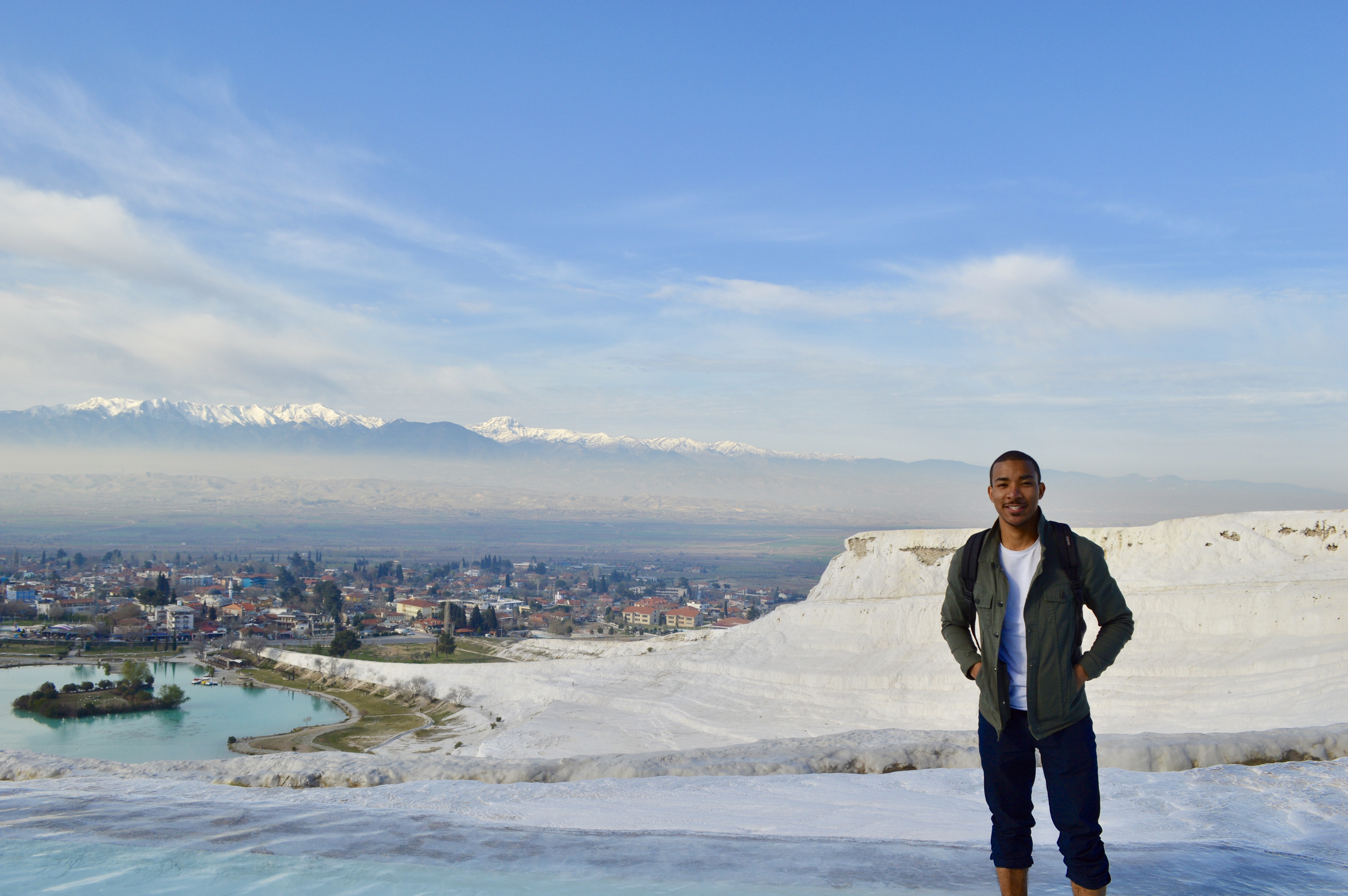 Pamukkale's terraces, a natural wonder
Pamukkale's terraces, a natural wonder -
Antalya: Relax on the beautiful beaches of Antalya, explore ancient ruins, and enjoy the vibrant nightlife of this popular resort city.
4. What Type of Cuisine Can Tourists Expect in Turkey?
Turkish cuisine is a delightful fusion of flavors, influenced by the country’s rich history and diverse geography. Prepare to indulge in a culinary journey filled with delicious dishes and unique ingredients.
-
Kebabs: Sample various types of kebabs, from the classic doner to the flavorful Adana and Urfa kebabs.
-
Mezes: Enjoy a selection of mezes, or small appetizers, such as hummus, baba ghanoush, stuffed grape leaves, and various salads.
-
Seafood: Indulge in fresh seafood along the coast, including grilled fish, calamari, and mussels.
-
Desserts: Savor traditional Turkish desserts like baklava, kunefe, and Turkish delight, sweet treats that will tantalize your taste buds.
-
Vegetarian Options: Turkey offers a variety of vegetarian dishes, including lentil soup, vegetable stews, and stuffed vegetables.
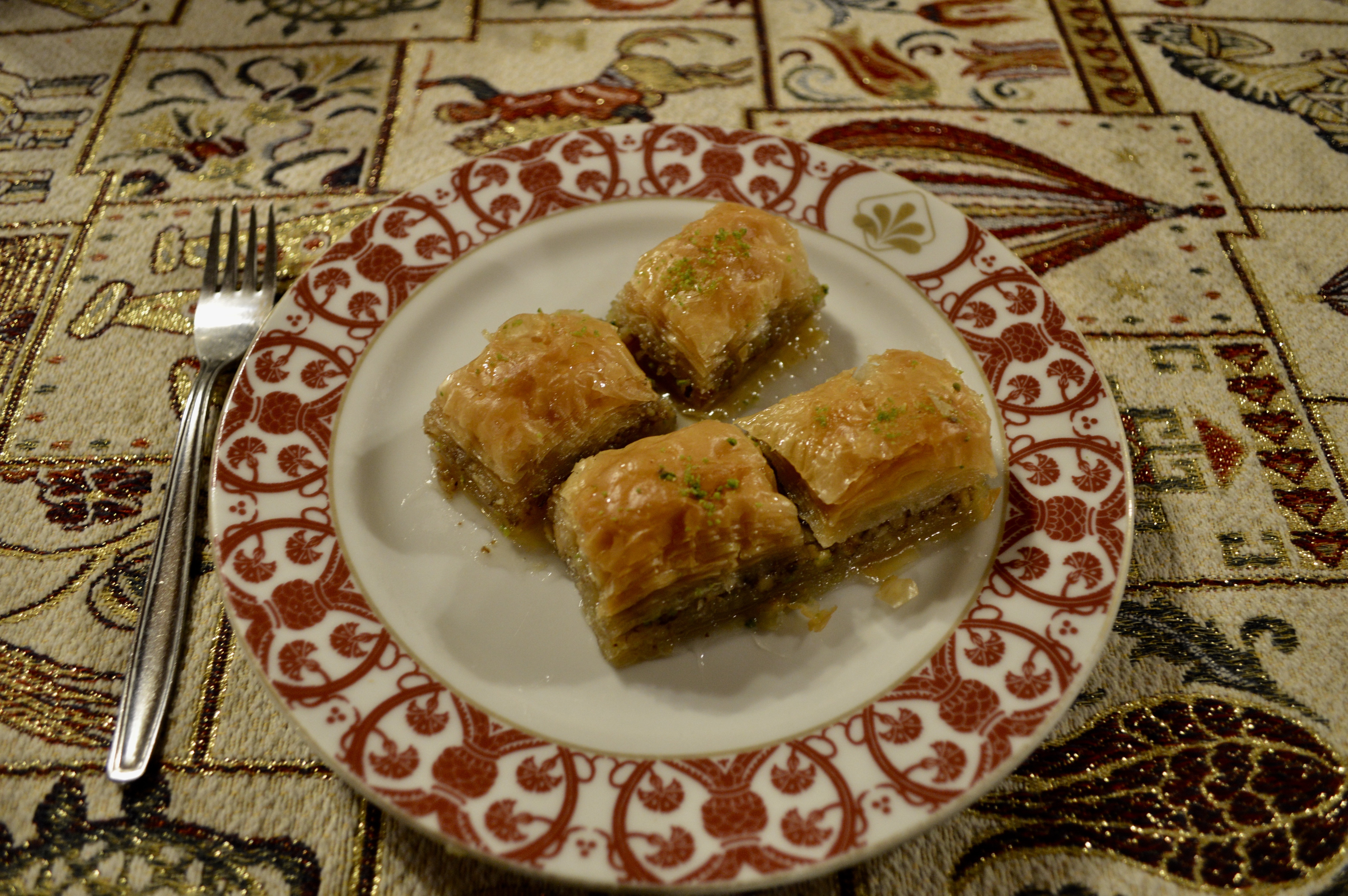 Delicious Turkish baklava with nuts and honey
Delicious Turkish baklava with nuts and honey
5. How Affordable Is Tourism in Turkey Compared to Other Destinations?
Turkey offers excellent value for money compared to many other popular tourist destinations, making it an attractive option for budget-conscious travelers.
-
Accommodation: Budget hotels and guesthouses are readily available, offering comfortable rooms at affordable prices.
-
Food: Enjoy delicious and affordable meals at local restaurants and street food stalls.
-
Transportation: Public transportation is efficient and inexpensive, making it easy to get around cities and travel between destinations.
-
Activities: Many attractions offer affordable entrance fees or free access, allowing you to explore the country without breaking the bank.
According to Numbeo, the cost of living in Turkey is significantly lower than in many Western European countries.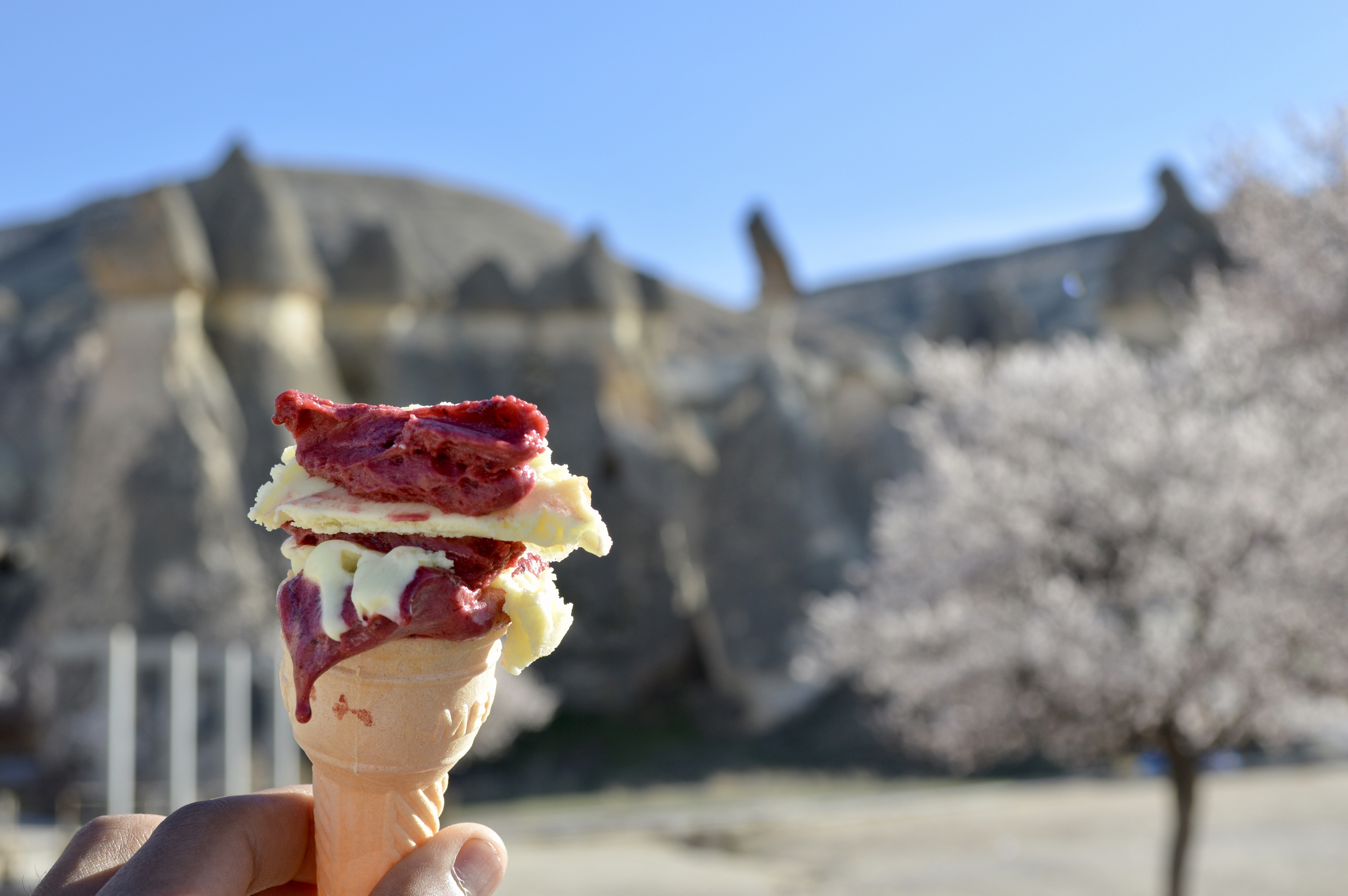 Affordable and tasty Turkish ice cream
Affordable and tasty Turkish ice cream
6. What Cultural Experiences Can Tourists Enjoy in Turkey?
Turkey offers a wealth of cultural experiences that provide insights into the country’s rich heritage and traditions.
- Whirling Dervishes: Witness the mesmerizing Sufi ceremony of the whirling dervishes, a spiritual and artistic performance.
- Turkish Baths (Hamams): Experience the traditional Turkish bath, a cleansing and rejuvenating ritual that has been practiced for centuries.
- Carpet Weaving: Learn about the art of Turkish carpet weaving and visit local workshops to see artisans at work.
- Traditional Music and Dance: Enjoy performances of traditional Turkish music and dance, showcasing the country’s vibrant cultural heritage.
7. What Are Some Tips for Planning a Tourism Trip to Turkey?
Planning a trip to Turkey requires careful consideration of various factors to ensure a smooth and enjoyable experience.
- Best Time to Visit: The best time to visit Turkey is during the spring (April-May) or fall (September-October) when the weather is mild and pleasant.
- Visa Requirements: Check visa requirements for your nationality and apply in advance if necessary.
- Currency: The Turkish Lira (TRY) is the official currency. It’s advisable to exchange currency upon arrival or use ATMs for withdrawals.
- Language: Turkish is the official language. While English is spoken in tourist areas, learning a few basic Turkish phrases can enhance your experience.
- Dress Code: Dress modestly when visiting religious sites, such as mosques.
- Respect Local Customs: Be mindful of local customs and traditions, and avoid public displays of affection.
- Stay Connected: Purchase a local SIM card or use Wi-Fi to stay connected and access information.
8. How Can SIXT.VN Enhance a Tourism Trip to Turkey?
SIXT.VN offers a range of services designed to enhance your travel experience in Turkey, ensuring convenience, comfort, and reliability.
-
Airport Transfers: Enjoy hassle-free airport transfers with professional drivers and comfortable vehicles, ensuring a smooth arrival and departure.
-
City Tours: Explore the top attractions with guided city tours, providing insights into the history and culture of each destination.
-
Hotel Bookings: Find the perfect accommodation with SIXT.VN’s hotel booking service, offering a wide range of options to suit your budget and preferences.
-
Intercity Travel: Travel comfortably and safely between cities with SIXT.VN’s reliable transportation services, including private car rentals and bus tickets.
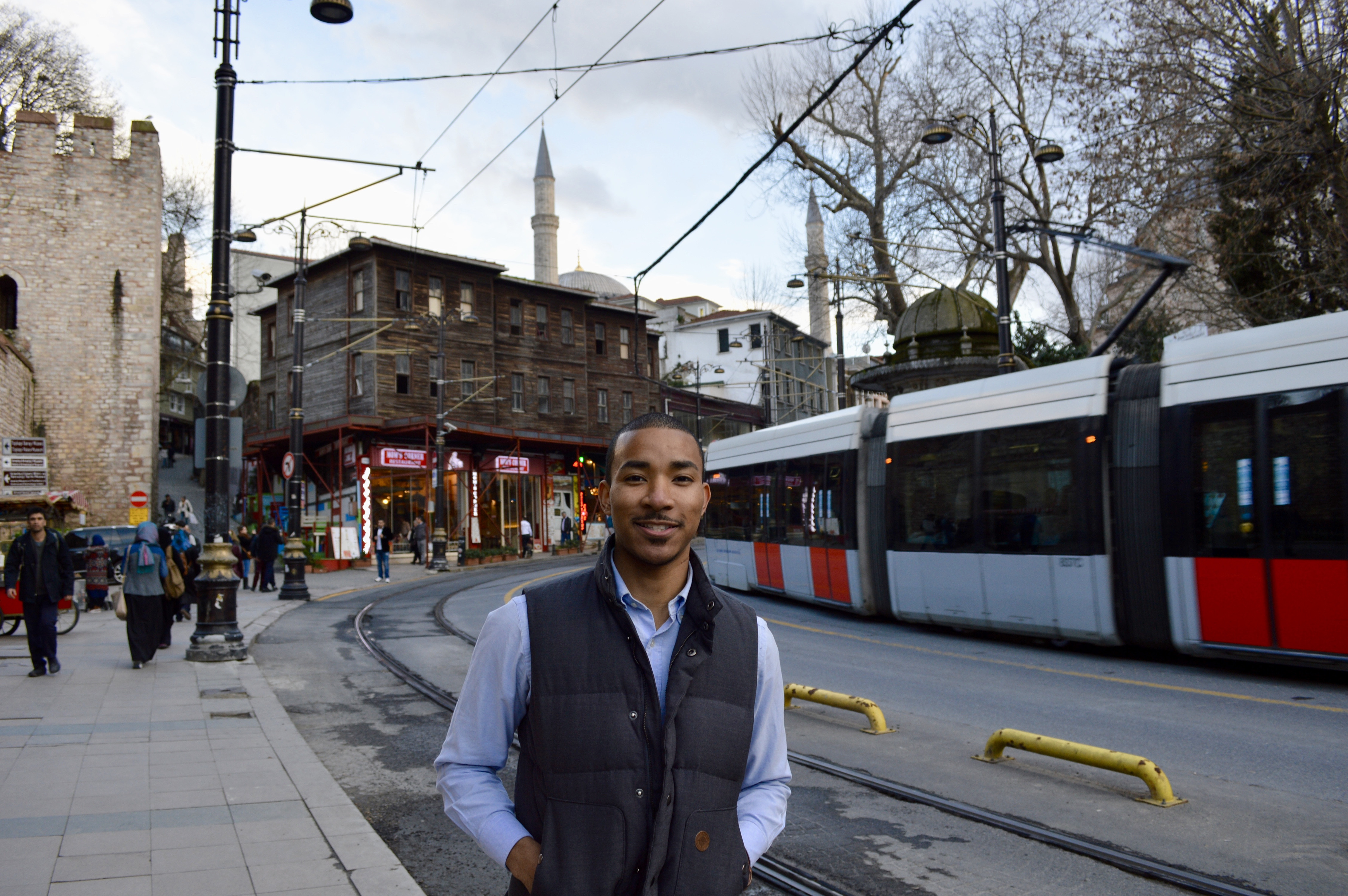 A comfortable bus for easy intercity travel
A comfortable bus for easy intercity travel
9. What Hidden Gems Can Tourists Discover in Turkey?
Beyond the popular tourist attractions, Turkey is filled with hidden gems waiting to be discovered.
- Safranbolu: Explore the charming Ottoman town of Safranbolu, a UNESCO World Heritage Site known for its well-preserved traditional houses.
- Mount Nemrut: Witness the monumental statues atop Mount Nemrut, a remote and awe-inspiring archaeological site.
- Kas: Discover the laid-back coastal town of Kas, known for its crystal-clear waters, diving opportunities, and picturesque harbor.
- Alaçatı: Stroll through the charming streets of Alaçatı, a Aegean town known for its stone houses, windmills, and windsurfing opportunities.
- Göbeklitepe: Explore Göbeklitepe, one of the world’s oldest known megalithic structures, dating back to the 10th millennium BCE.
10. What Are the Latest Trends in Turkey Tourism?
Turkey’s tourism sector is constantly evolving, with new trends and developments shaping the travel experience.
- Sustainable Tourism: An increasing focus on sustainable tourism practices, with initiatives aimed at preserving the environment and supporting local communities.
- Cultural Tourism: Growing interest in cultural tourism, with travelers seeking authentic experiences and immersion in local traditions.
- Adventure Tourism: Rising popularity of adventure tourism activities, such as hiking, rock climbing, and water sports.
- Digital Nomadism: Attracting digital nomads with its affordable cost of living, reliable internet connectivity, and vibrant cultural scene.
- Health Tourism: Growing market for health tourism, with Turkey offering a range of medical and wellness services.
11. What Unique Souvenirs Can Tourists Bring Home from Turkey?
When visiting Turkey, tourists have an array of unique and culturally rich souvenirs to choose from. These items not only serve as mementos of their trip but also reflect the country’s vibrant heritage and craftsmanship. Here are some popular and distinctive souvenirs that visitors can bring home from Turkey:
- Turkish Delight (Lokum): This sweet confection is a classic Turkish treat, available in a variety of flavors such as rose, pistachio, and hazelnut. It’s a perfect edible souvenir to share with friends and family.
- Turkish Coffee Set: A traditional Turkish coffee set includes a beautifully designed pot (cezve), small cups, and saucers. Turkish coffee has a unique brewing method and a strong, distinct flavor, making it a delightful cultural experience to recreate at home.
- Ceramics and Pottery: Turkish ceramics are renowned for their intricate designs and vibrant colors. Items such as plates, bowls, and decorative tiles featuring traditional Ottoman patterns make for stunning and functional souvenirs.
- Handmade Carpets and Kilims: Turkish carpets and kilims are exquisite examples of the country’s textile heritage. These handmade pieces often feature complex geometric patterns and rich colors, reflecting the artistry of the weavers.
- Olive Oil Products: Turkey is a significant producer of high-quality olive oil. Souvenir options include bottles of extra virgin olive oil, olive oil soaps, and other skincare products made with natural olive oil.
- Spices: The Spice Bazaar in Istanbul is a treasure trove of aromatic spices. Visitors can purchase a variety of Turkish spices such as saffron, cumin, paprika, and sumac to add authentic flavors to their cooking.
- Jewelry: Turkish jewelry often incorporates traditional motifs and materials such as silver, turquoise, and semi-precious stones. Handmade bracelets, necklaces, and earrings make for elegant and meaningful souvenirs.
- Nazar Boncugu (Evil Eye): The Nazar Boncugu, or “evil eye” charm, is a popular amulet believed to protect against negative energy. These blue glass beads are available in various forms, including keychains, pendants, and wall hangings.
- Textiles: Besides carpets, other Turkish textiles such as scarves, shawls, and towels made from high-quality cotton or silk are excellent souvenirs. Look for items with traditional patterns or embroidery.
- Copperware: Turkish copperware, including pots, pans, and decorative items, is known for its durability and craftsmanship. These items are often intricately decorated and can add a touch of Turkish charm to any home.
12. What Are Some Common Misconceptions About Tourism in Turkey?
There are several misconceptions about tourism in Turkey that can deter potential travelers. Addressing these myths can provide a more accurate and appealing view of the country as a travel destination. Here are some common misconceptions and the realities behind them:
-
Misconception: Turkey is not safe for tourists due to political instability and terrorism.
- Reality: While it’s essential to stay informed about current events, major tourist areas in Turkey, such as Istanbul, Cappadocia, and the Aegean and Mediterranean coasts, are generally safe. The Turkish government takes significant measures to ensure the safety of tourists. Always check travel advisories from your home country, but don’t let fear prevent you from experiencing Turkey’s beauty and hospitality.
-
Misconception: Turkey is only about historical sites and ancient ruins.
- Reality: While Turkey boasts incredible historical sites like Ephesus and Hagia Sophia, it also offers diverse landscapes, vibrant cities, and modern attractions. From the beaches of Antalya to the hot air balloons of Cappadocia and the bustling bazaars of Istanbul, there’s something for every type of traveler.
-
Misconception: Turkey is too conservative and not welcoming to Western tourists.
- Reality: Turkey is a secular country with a blend of Eastern and Western cultures. While it’s important to respect local customs, most Turks are very welcoming and hospitable to tourists. In tourist areas, you’ll find a relaxed atmosphere and plenty of people who speak English.
-
Misconception: It’s difficult to travel around Turkey.
- Reality: Turkey has a well-developed transportation infrastructure, including a network of domestic flights, modern buses, and trains. Major cities have efficient public transportation systems, and car rentals are readily available. Services like SIXT.VN can also help arrange reliable and comfortable transportation.
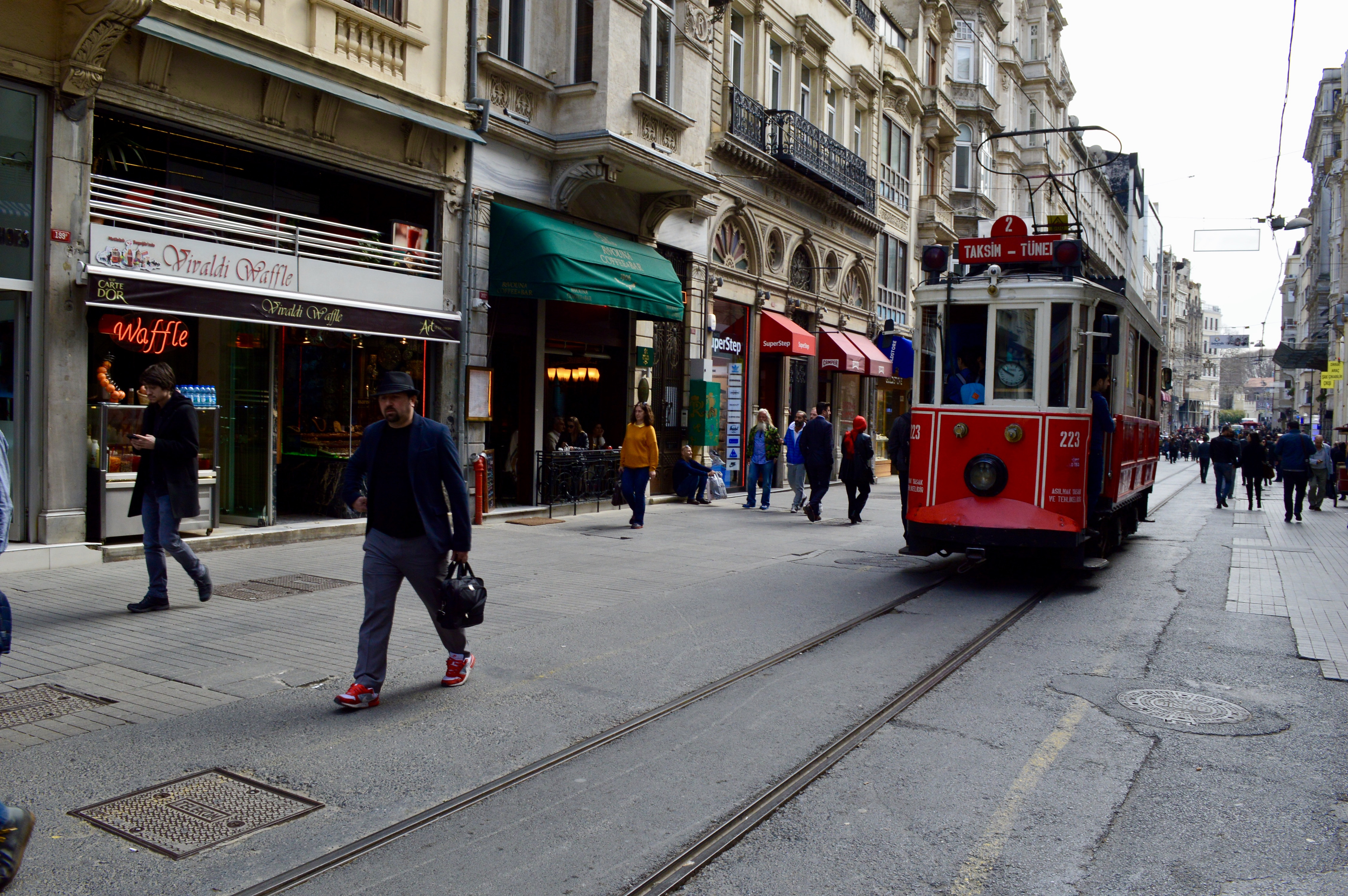 Easy access to transportation in Turkey
Easy access to transportation in Turkey -
Misconception: Turkish cuisine is limited to kebabs and Turkish Delight.
- Reality: Turkish cuisine is incredibly diverse and flavorful, influenced by Ottoman, Mediterranean, and Middle Eastern traditions. While kebabs and Turkish Delight are popular, there’s a vast array of dishes to explore, including mezes (appetizers), seafood, vegetable dishes, soups, and desserts.
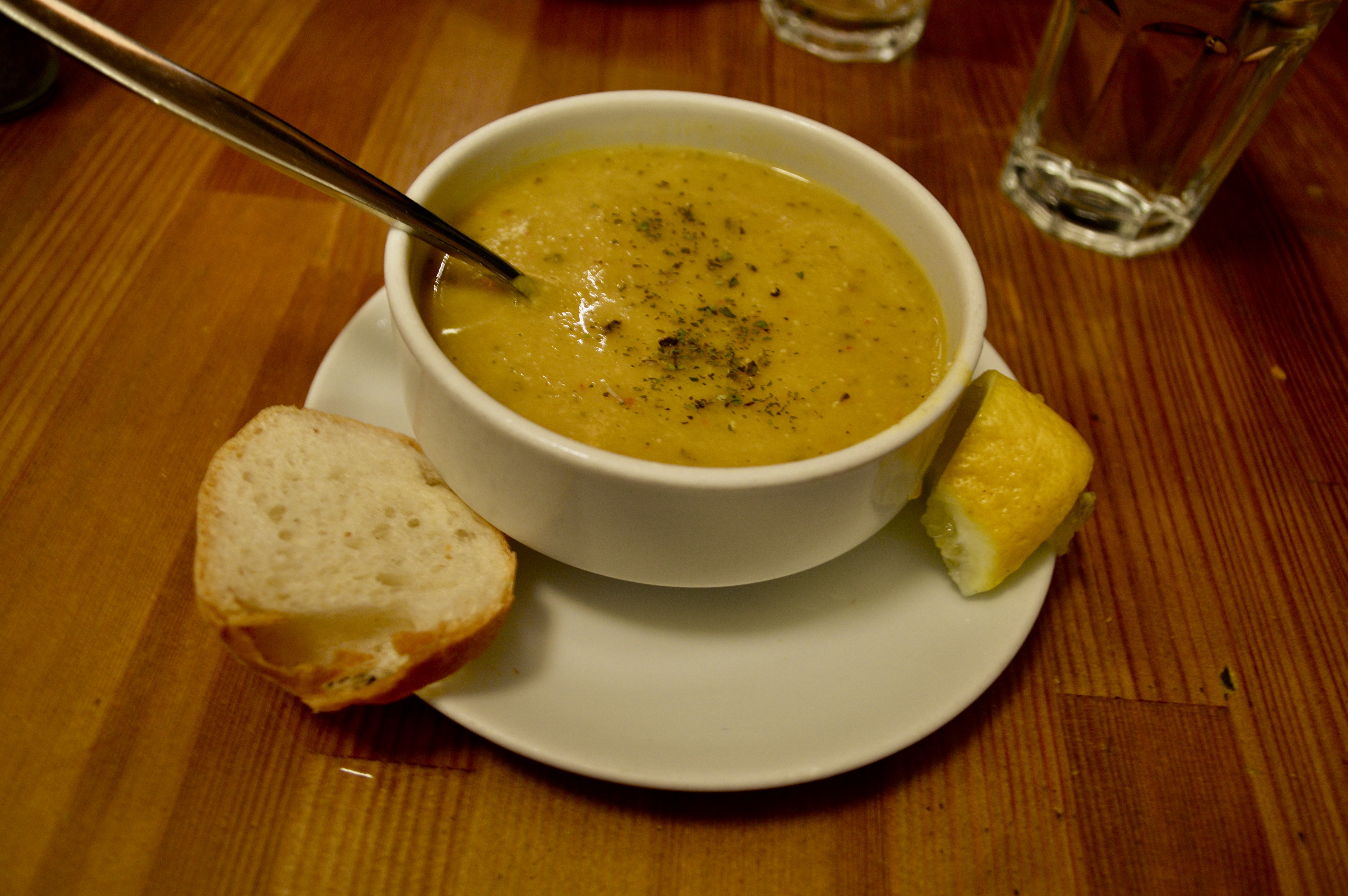 A basket of delicious Turkish bread
A basket of delicious Turkish bread -
Misconception: Turkey is an expensive travel destination.
- Reality: Turkey offers excellent value for money compared to many European countries. Accommodation, food, transportation, and activities are generally affordable, making it a budget-friendly destination for travelers.
-
Misconception: There’s a significant language barrier in Turkey.
- Reality: While Turkish is the official language, English is widely spoken in tourist areas, hotels, restaurants, and shops. Learning a few basic Turkish phrases can enhance your experience, but it’s not essential for getting around and communicating.
-
Misconception: Turkish culture is difficult to understand for Westerners.
- Reality: Turkish culture is a blend of Eastern and Western influences, making it relatively easy for Westerners to appreciate and understand. Turks are known for their hospitality and are often eager to share their culture with visitors.
13. What Events and Festivals Should Tourists Consider When Planning a Trip to Turkey?
Planning a trip to Turkey around its various events and festivals can greatly enhance the travel experience, providing deeper insights into the country’s culture, traditions, and celebrations. Here are some notable events and festivals that tourists should consider:
- Istanbul Film Festival (April): One of the most significant film festivals in Turkey, showcasing a diverse range of international and Turkish films. It attracts filmmakers, actors, and film enthusiasts from around the world.
- Istanbul Tulip Festival (April): Celebrates the blooming of millions of tulips in Istanbul’s parks and gardens. The city is adorned with vibrant floral displays, creating a stunning visual spectacle.
- Victory Day (August 30): A national holiday commemorating the victory in the Battle of Dumlupınar in 1922, a crucial event in the Turkish War of Independence. Parades and ceremonies are held throughout the country.
- Republic Day (October 29): Celebrates the proclamation of the Republic of Turkey in 1923. Festivities include parades, concerts, and fireworks displays.
- Mevlana Festival (December): Held in Konya, this festival commemorates the Sufi mystic and poet Jalaluddin Rumi (Mevlana). It features Whirling Dervishes ceremonies, Sufi music, and cultural events.
14. What Are the Best Ways to Get Around Turkey as a Tourist?
Navigating Turkey as a tourist is generally straightforward, thanks to a variety of transportation options. The best way to get around depends on your budget, time constraints, and travel style. Here’s a breakdown of the most common and efficient ways to travel within Turkey:
-
Domestic Flights: For long distances, domestic flights are the quickest and most convenient option. Turkey has a well-developed network of domestic routes, with Turkish Airlines and Pegasus Airlines being the primary carriers. Flying can save considerable time, especially when traveling between cities like Istanbul and Antalya or Cappadocia.
-
Buses: Turkey has an extensive and reliable bus network connecting almost all cities and towns. Buses are a cost-effective option, and many companies offer comfortable coaches with amenities such as Wi-Fi, personal entertainment screens, and refreshments. Night buses are a popular way to save on accommodation costs while traveling long distances.
 A comfortable bus for easy intercity travel
A comfortable bus for easy intercity travel -
Car Rentals: Renting a car provides the flexibility to explore Turkey at your own pace, especially if you plan to visit remote areas or smaller towns. Major international rental companies operate in Turkey, and it’s advisable to book in advance, particularly during peak tourist season. Be aware that driving conditions can vary, and traffic in major cities can be challenging.
-
Trains: Turkey’s railway network is undergoing modernization, with high-speed trains connecting major cities like Istanbul, Ankara, and Konya. Trains are a comfortable and scenic option, but the network is not as extensive as the bus network.
-
Taxis and Ride-Sharing Services: Taxis are readily available in major cities, but it’s essential to ensure the meter is running or negotiate the fare in advance. Ride-sharing services like Uber are also available in some cities.
-
Ferries: Ferries are a convenient way to travel along the coast and to islands. Services operate between Istanbul and various destinations along the Marmara Sea, as well as between mainland Turkey and Greek islands.
-
Local Transportation: Within cities, options include buses, trams, metro, and dolmuş (shared minibuses). Istanbul, for example, has a comprehensive public transportation system that makes it easy to get around.
-
SIXT.VN Services: SIXT.VN offers a range of transportation services, including airport transfers, private car rentals, and organized tours, providing a hassle-free travel experience.
15. What Are the Best Regions to Visit in Turkey for Different Interests?
Turkey offers a diverse range of regions, each with its unique attractions and activities. Identifying the best regions to visit based on specific interests can help tourists tailor their trips for the most fulfilling experience. Here’s a guide to some of Turkey’s top regions and what they offer:
-
Istanbul: Best for History, Culture, and City Life
- Attractions: Hagia Sophia, Blue Mosque, Topkapi Palace, Grand Bazaar, Spice Bazaar, Basilica Cistern, Süleymaniye Mosque
- Activities: Exploring historical sites, shopping, experiencing Turkish cuisine, visiting museums, taking a Bosphorus cruise
- Why Visit: Istanbul is a melting pot of cultures and a city rich in history, offering a unique blend of Eastern and Western influences.
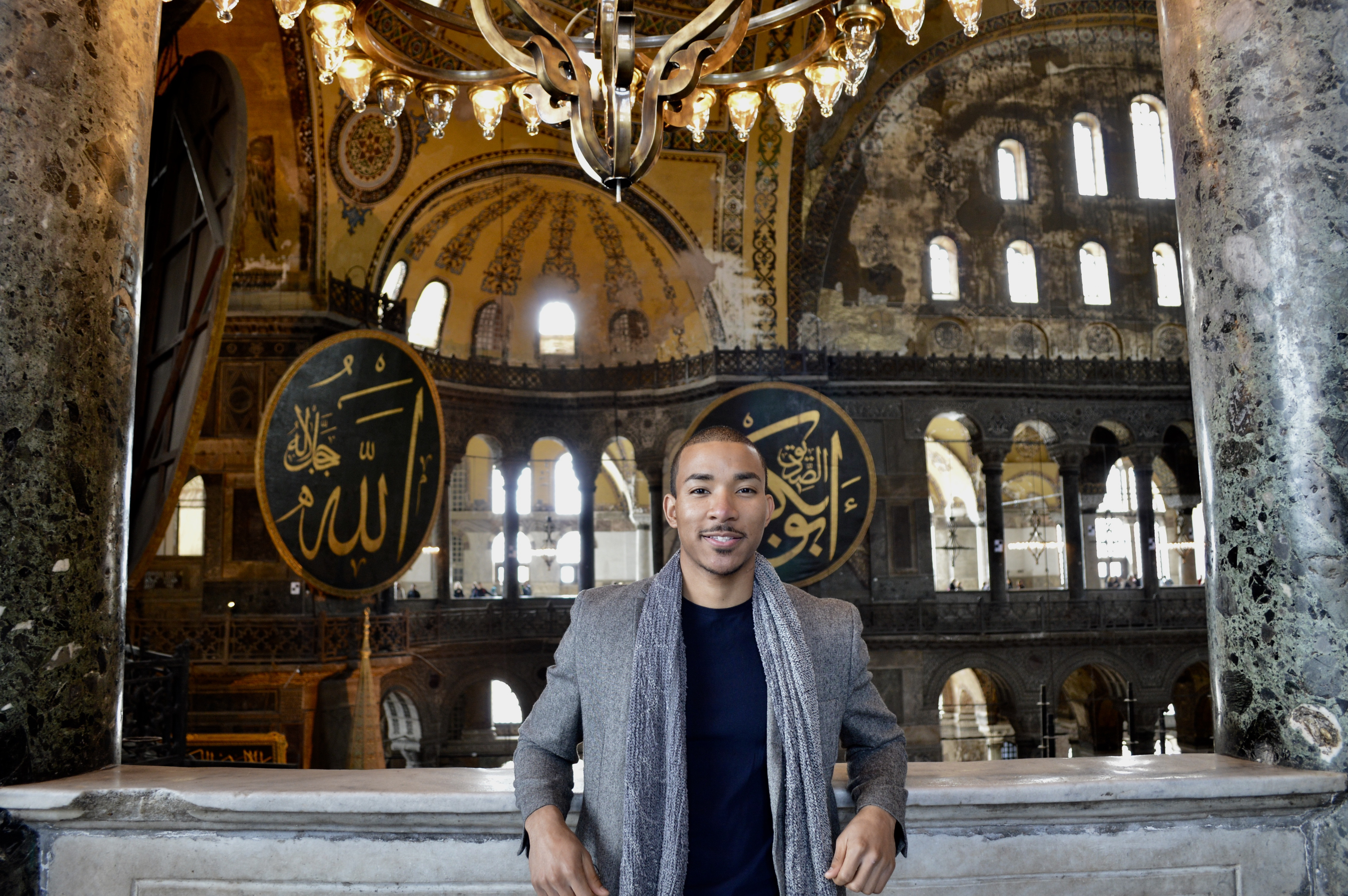 A view of Hagia Sophia, a historic landmark
A view of Hagia Sophia, a historic landmark -
Cappadocia: Best for Unique Landscapes and Adventure
- Attractions: Fairy chimneys, underground cities, Göreme Open Air Museum, Uchisar Castle, Pasabag (Monk’s Valley)
- Activities: Hot air ballooning, hiking, exploring underground cities, visiting cave churches, staying in a cave hotel
- Why Visit: Cappadocia’s surreal landscapes and unique geological formations make it a must-see destination for adventure and nature lovers.
-
Aegean Coast (Izmir, Ephesus, Bodrum): Best for Ancient History and Beach Holidays
- Attractions: Ephesus Ancient City, Temple of Artemis, House of the Virgin Mary, Bodrum Castle, beaches of Izmir and Bodrum
- Activities: Exploring ancient ruins, relaxing on beaches, sailing, windsurfing, visiting historical sites
- Why Visit: The Aegean Coast combines rich history with stunning beaches and vibrant coastal towns, offering a perfect blend of relaxation and exploration.
-
Mediterranean Coast (Antalya, Kas, Fethiye): Best for Beaches and Outdoor Activities
- Attractions: Antalya Old Town (Kaleiçi), Düden Waterfalls, Termessos Ancient City, Lycian Way, Ölüdeniz Beach, Butterfly Valley
- Activities: Swimming, sunbathing, hiking, paragliding, diving, exploring ancient ruins
- Why Visit: The Mediterranean Coast is renowned for its beautiful beaches, crystal-clear waters, and a wide range of outdoor activities.
-
Central Anatolia (Ankara, Konya): Best for History and Cultural Heritage
- Attractions: Ankara Castle, Museum of Anatolian Civilizations, Mausoleum of Atatürk (Anıtkabir), Mevlana Museum in Konya, Alaeddin Mosque
- Activities: Visiting historical sites, exploring museums, experiencing Sufi culture, learning about Turkish history
- Why Visit: Central Anatolia offers a deep dive into Turkish history and culture, with significant historical sites and museums.
-
Eastern Turkey (Mount Nemrut, Kars): Best for Unique Landscapes and Cultural Experiences
- Attractions: Mount Nemrut, Ani Ruins, Ishak Pasha Palace, Lake Van, Akdamar Island
- Activities: Hiking, exploring ancient ruins, visiting historical sites, experiencing Kurdish culture
- Why Visit: Eastern Turkey offers a unique and off-the-beaten-path travel experience with stunning landscapes and rich cultural heritage.
16. How Has Political Stability Affected Tourism in Turkey, and What Is the Current Outlook?
Political stability has significantly influenced tourism in Turkey over the years. Periods of unrest or political turmoil have often led to a decline in tourist arrivals, while times of stability have seen a resurgence in the industry. Here’s a look at how political stability has affected tourism and the current outlook:
-
Historical Impact:
- Periods of Instability: Events such as the Gezi Park protests in 2013, the attempted coup in 2016, and regional conflicts have negatively impacted tourism, causing concerns about safety and security.
- Economic Consequences: Declines in tourism have had economic repercussions, affecting businesses that rely on tourist revenue, such as hotels, restaurants, and tour operators.
-
Government Measures:
- Promoting Security: The Turkish government has implemented various measures to enhance security in tourist areas, including increased police presence and improved surveillance.
- Tourism Promotion: The government has also launched campaigns to promote Turkey as a safe and attractive destination, highlighting its cultural and historical attractions.
-
Current Outlook:
- Recent Trends: In recent years, there has been a gradual recovery in Turkey’s tourism sector, with increasing numbers of visitors. This recovery is attributed to improved security measures, successful promotional efforts, and the country’s diverse offerings.
- Economic Factors: The devaluation of the Turkish Lira has made Turkey a more affordable destination for many tourists, further boosting its appeal.
Turkey’s tourism industry has shown resilience in the face of political challenges. With ongoing efforts to ensure safety and promote the country’s attractions, the outlook for tourism remains positive.
17. What Are Some Essential Turkish Phrases for Tourists?
Learning a few basic Turkish phrases can significantly enhance your travel experience in Turkey, showing respect for the local culture and facilitating smoother interactions. Here are some essential phrases for tourists:
- Merhaba: Hello
- Günaydın: Good morning
- İyi günler: Good day
- İyi akşamlar: Good evening
- İyi geceler: Good night
- Evet: Yes
- Hayır: No
- Teşekkür ederim: Thank you
- Rica ederim: You’re welcome
- Lütfen: Please
- Affedersiniz: Excuse me
- Nasilsiniz?: How are you?
- İyiyim, teşekkür ederim: I’m fine, thank you
- Adınız ne?: What’s your name?
- Benim adım…: My name is…
- Memnun oldum: Pleased to meet you
- Ne kadar?: How much?
- Yardım edebilir misiniz?: Can you help me?
- Tuvalet nerede?: Where is the toilet?
- Hesap lütfen: The bill, please
- Türkçe bilmiyorum: I don’t speak Turkish
- İngilizce biliyor musunuz?: Do you speak English?
- Güle güle: Goodbye
18. How Does Turkey Balance Modern Tourism with Cultural Preservation?
Balancing modern tourism with cultural preservation is a critical challenge for Turkey, given its rich historical heritage and growing popularity as a tourist destination. Here are some strategies and initiatives that Turkey employs to achieve this balance:
- UNESCO World Heritage Sites: Designating significant historical and cultural sites as UNESCO World Heritage Sites helps protect them through international recognition and funding. This designation encourages responsible tourism practices and conservation efforts.
- Regulations and Laws: Implementing strict regulations and laws to protect historical sites and cultural artifacts from damage or exploitation. These laws often include restrictions on construction, renovation, and commercial activities within designated areas.
- Sustainable Tourism Practices: Promoting sustainable tourism practices that minimize the environmental and cultural impact of tourism. This includes encouraging eco-friendly accommodations, responsible tour operations, and waste reduction initiatives.
- Community Involvement: Engaging local communities in tourism development and preservation efforts. This ensures that tourism benefits local residents and that cultural traditions are maintained and celebrated.
- Education and Awareness: Raising awareness among tourists and locals about the importance of cultural preservation through educational programs, signage, and interpretive centers.
- Restoration and Conservation Projects: Investing in restoration and conservation projects to preserve historical sites and cultural heritage. These projects often involve skilled artisans and experts who use traditional techniques to repair and maintain structures.
- Controlling Tourist Numbers: Managing tourist numbers to prevent overcrowding and damage to sensitive sites. This can involve implementing ticketing systems, limiting access to certain areas, and promoting off-season travel.
By implementing these strategies, Turkey aims to ensure that tourism contributes to the country’s economic development while preserving its rich cultural heritage for future generations.
Ready to explore the wonders of Turkey? Let SIXT.VN be your trusted companion, providing seamless travel solutions tailored to your needs. From airport transfers to guided tours, we ensure a memorable and stress-free experience. Contact us today and start planning your Turkish adventure Address: 260 Cau Giay, Hanoi, Vietnam. Hotline/Whatsapp: +84 986 244 358. Website: SIXT.VN.
FAQ: Exploring Tourism in Turkey
1. Is Turkey a good place for a first-time traveler?
Turkey is an excellent choice for first-time travelers, offering a mix of Eastern and Western cultures with many historical sites.
2. What are the best cities to visit in Turkey?
Istanbul, Antalya, and Cappadocia are among Turkey’s best cities, each offering unique attractions and experiences.
3. How can I travel affordably in Turkey?
Opt for local transportation, eat at local eateries, and choose budget-friendly accommodations to travel economically in Turkey.
4. Are credit cards widely accepted in Turkey?
Credit cards are accepted in most tourist areas; however, carrying some cash is advisable, especially for smaller establishments or rural areas.
5. What should I wear when visiting religious sites in Turkey?
Dress modestly, covering shoulders and knees, especially when visiting mosques and religious sites.
6. How do I get a visa for Turkey?
Check the visa requirements based on your nationality and apply online through the official e-Visa website or the Turkish embassy.
7. What is the local currency in Turkey?
The local currency is the Turkish Lira (TRY); ATMs are widely available for cash withdrawals.
8. What languages are spoken in Turkey?
Turkish is the official language, but English is commonly spoken in tourist areas.
9. What are some popular Turkish dishes I should try?
Try kebabs, mezes, baklava, and Turkish coffee for an authentic culinary experience.
10. How can SIXT.VN help me with my travel plans in Turkey?
SIXT.VN offers reliable airport transfers, city tours, and comfortable intercity travel, enhancing your overall travel experience in Turkey.



